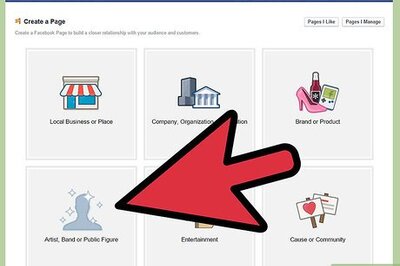
views
Being a Model Employee

Take direction. Make sure that you’re open to input from coworkers and supervisors. By being open to taking direction, you’ll show that you’re a team player who is willing to listen to and work with others. Listen to the advice of coworkers. Use every interaction as an opportunity to learn and to become a model employee. For example, if you're working on a collaborative project, follow the lead of senior employees and ask them questions so you understand their process better. Be attentive during your training process. Make sure you’re focused on learning everything your trainer or supervisor is teaching you. For example, if your trainer is showing you how to restart a piece of machinery, try to verbally repeat the steps that they're taking so you internalize the process better. Avoid thinking you know best. Remember, it is likely that your coworkers or supervisors have been doing this a lot longer than you. If they haven’t, they might have some experience or insight you don’t have.

Accept responsibility. The hallmark of any model employee is one that accepts responsibility for both their positive and negative actions. By accepting responsibility, you’ll show accountability and the maturity that characterizes model employees. Own up to any mistake you make. For example, if you lost an important client, let your boss know. Let your boss know that you learn from your successes and failures. For example, after losing an account, let your boss know that you didn’t understand the temperamental nature of the client, and that you’ll pay more attention to the intricacies of clients’ personalities so you can cater to them better. Never hide, deny, or lie about any negative outcome in the workplace. For example, embellishing or lying about your success or progress on a specific project as a junior employee may get you into trouble if your employer things you can handle more responsible than you are ready for.

Be proactive. The best employees are ones that put themselves out in front of issues that confront the business every day. By being proactive, you’ll show your boss that you’re a go-getter and a real model employee. Volunteer for challenging assignments. For instance, if your boss asks for volunteers to deal with a problem client, volunteer if you think you can help. Remember, you don’t need to volunteer every time your boss asks for volunteers, but make sure you do so semi-regularly. Be a problem solver – think outside the box to solve longstanding problems. For instance, if you encounter logistics problems in your job daily (i.e. you’re unable to ship a product fast enough to a client), try to find a new, innovative, way to get your product out. For example, contact different shippers or consider arranging with a third party to house your product closer to important clients. Don’t ask to be micromanaged. One of the biggest things bosses and supervisors dislike is having to micromanage their employees. Thus, avoid emailing or calling your boss with questions that you could otherwise answer yourself. If you need help, look to a coworker or to the employee manual before inquiring with your boss.
Interacting with Your Boss

Communicate regularly. Communication is key to a positive and fruitful relationship with your boss. Without regular communication, you won’t be able to develop a working relationship. In addition, you won’t be apprised of team efforts and the progress of company initiatives. Always respond promptly to your boss’s email or calls. Try to respond to calls or emails your boss places during work hours within an hour or two. Never respond more than 24 hours after receiving an email or call during the work week. Attend all meetings with your boss. In addition, show up on time. Check in with your boss or offer them status updates on your projects from time to time. This doesn’t mean you should keep them apprised of your daily affairs, rather, send them an email every two weeks or every month letting them know about some of your accomplishments and challenges. EXPERT TIP Elizabeth Douglas Elizabeth Douglas CEO of wikiHow Elizabeth Douglas is the CEO of wikiHow. Elizabeth has over 15 years of experience working and managing teams in the tech industry. She has held roles in multiple areas, including computer engineering, user experience, and product management. She received her BS in Computer Science and her Master of Business Administration (MBA) from Stanford University. Elizabeth Douglas Elizabeth Douglas CEO of wikiHow Show your boss you're committed to the company. Elizabeth Douglas, the CEO of wikiHow, emphasizes the importance of loyalty in building a relationship with your boss. "Assuming you have a supervisor that is a good person, and they're not going to take credit for your work, you can improve your relationship by being loyal to them and communicating really well. That will let them know you're someone they can depend on."

Connect with them. Spend some time trying to connect with your boss as a colleague and a mentor. This will show them that you value, respect, and even look up to them. Ask them for advice. For instance, ask something like “Mrs. Fuller, I’m having trouble meeting the needs of one of our clients, what would you do if you were in my situation?” Inquire about their experience as a junior employee. Say something like “Mr. Alcott, can you share some of the challenges you met when you first joined the company?” Engage them in discussion about their personal life in a limited capacity. Asking your boss about how their daughter is doing during her first year of college is acceptable – and a good way to connect. However, don’t ask them about their marital relations or anything more personal.

Be respectful. One of the easiest ways to alienate your boss is to show them that you don’t respect them as a person or as a manager. Thus, you should show your boss that you value them and the supervision and guidance they provide you on a daily basis. Always address your boss by their preferred title, “Mr.” “Mrs.” or “Dr.” Never address your boss by their first name or a nickname unless they specifically tell you to do so. This goes for electronic communication like email and texts, too. Don’t underestimate the importance of pleasantries like “please,” “thank you” or even “I’m sorry.” Never interrupt your boss while they are speaking. Listen to your boss whenever they speak to you. For instance, whenever you have a meeting or even casual interaction with them, stop what you’re doing and internalize what they are saying.

Work to resolve conflict. While communicating, connecting, and respecting your boss will go a long way, you might inevitably find yourself in conflict with your boss. If this happens, you need to work diligently to quickly resolve the issue. Never insult your boss. Accept their resolution, if it is reasonable. Avoid contradicting your boss, if possible. Apologize, if appropriate. If you find it hard to resolve conflict, or to accept your boss's resolution, you may consider escalating it to a higher level supervisor. This, though, may create obstacles to advancement in your career.
Being a Productive Team Member

Be positive. A positive attitude is key in showing that you are a valued and needed part of the organization. If you’re not positive, people – your coworkers and supervisors – won’t want to work with you. Emphasize the good. For example, when talking to someone about a problem you are experiencing at work, explain it as an opportunity for growth, rather than something that frustrates you. In addition, emphasize the good in people – clients, coworkers, or others – instead of the bad. Avoid demonstrating negative body language, such as being hunched over, crossing your arms, or grinding your teeth. Instead, you should smile and hold yourself in an inviting and relaxed posture. Whenever anyone asks how you’re doing, share something positive, rather than negative. For example, if your boss asks you how you like the weather (and it’s raining), tell them that rain makes you feel cozy.

Embrace the company culture. A company culture is the specific viewpoint, practices, and ideas embraced by a specific business. By embracing the company culture, you’ll show your boss that you’re not only a team player, but that you identify with the goals of the company. Read the history of your company. In addition, read any literature or employee handbooks. Attend workshops and other gatherings where management and employees meet – you ‘ll learn a lot about the company culture at these gatherings. Notice how everyone, including your boss, does things. Don’t try to shake things up or to get things done your own way. For example, if you notice that meetings usually run long and people talk about trivial things, that may be how things are done in your organization. Don’t attack it.

Act as a team player. When you act as a team player, you let everyone around you know that you not only take your job seriously, but that you also value them as individuals and as professionals. Never shirk your responsibilities when you do collaborative work. If you’re tasked with some sort of group work, show yourself to be a team player and a collaborator, rather than someone who needs to be directed by another junior employee. Always highlight how others helped you when you make any major accomplishments at work. For example, if you make some sort of breakthrough in the laboratory, make sure you say something like “I couldn’t have done it without the help of Lydia and Theodore.” Don’t criticize others for their faults, rather, offer them guidance and mentor them. If your boss sees you mentoring another employee, they’ll likely think of you more highly. Attend all work meetings and gatherings. This includes weekend gatherings like family BBQs and holiday engagements. You’ll show that you can not only be a member of the work team, but a member of the company family, too.


















Comments
0 comment